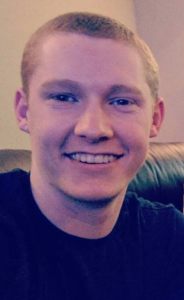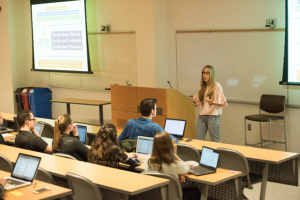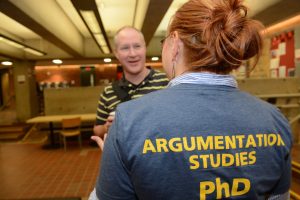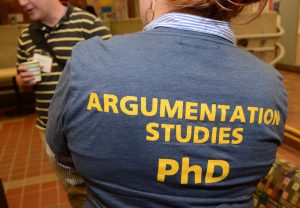The Provost’s Question of the Month is a chance for faculty, staff and students to tell the U what they think about different aspects of life on campus. You tell us about your experiences, and we give a beautiful University of Windsor hoodie to the writer of the winning response!
This month’s Question of the Month is about student life in first year – and particularly experiences of residence!
The Background:
The University of Windsor has hundreds of students living in residence on campus. Most of them are first-year students; most of them are from outside the Windsor-Essex area.
Many local first-year students live at home. And why not? Why live in residence on campus when you can continue bunking down under your parents’ roof for free? What’s the advantage? Why should a local student live in residence in first year?
Well, there are a number of reasons. Independence. Meeting new people. Immersing yourself in the full university experience. Let’s face it, commuting to campus just before class and then heading home again right afterwards isn’t the greatest way to take advantage of all that university has to offer.
Research shows that students who live in residence in first year have a greater sense of “belonging, engagement, and openness to diversity” (NSSE). They also have a higher first-year GPA, a higher retention rate from first year to second, and a higher graduation rate (Academica Group 2017).
We know that interacting with your peers is a factor in succeeding academically, and one of the best ways to do that in first year is by living in residence.
For our local students, you’ve made an awesome choice in choosing UWindsor. What I’m suggesting is that going to your local university AND living on campus in first year is the best of both worlds
The Question:
The Provost’s Question of the Month for January 2018 is
• If you are/were a first-year local student in residence, why did you choose to live on campus?
• And if you wanted to encourage someone else to do what you did, what would be your top three selling points?
Please send your responses to vpacademic@uwindsor.ca by J
CODY CABA
Cody Caba is the 2017 recipient of the GATA Award for Educational Leadership. Cody is a recent Master’s graduate coming from the Department of Chemistry and Biochemistry. His research focusing on an enzyme involved in neurological diseases has been featured on the University’s website for its successful acquisition of a $200,000 grant. His teaching career began in his fourth year and continued throughout his graduate studies for a total of five semesters of teaching. Cody is currently a PhD candidate at McMaster University, studying the biochemical aspects of infectious disease control. He hopes to provide impactful, far-reaching insight about the world on the molecular level.
The GATA Network Coordinators conducted the following interview with Cody:
1. What was the most difficult part of the nomination process?
Asking people for reference letters was most difficult as many came from past students of mine that I had to get in touch with once again. It was a nice surprise to see how quickly they were able to come forward and help.
2. Had teaching and learning been a big part of your life before you won the award? How did the award change your views on teaching?
I never consciously focused on teaching or learning before my award. As a student, I did my best to establish good study habits and learn what type of person I was in the classroom. I came to realize where I excelled and what attributes a teacher (professor) must have to gain my attention and instill a drive in myself for learning. As a teaching assistant, my goal was never to be recognized for my efforts; I did not know this award existed prior to my nomination. I tried to channel all that I looked for in a good teacher and bring that forward for whomever I taught. Upon receipt of my nomination it became apparent that my outlook on teaching, although not extensively calculated, was indeed effective. My current views on teaching have changed quite drastically since. I know more than ever how good teaching practices can have a marked positive impact on students, with long lasting effects. As well, it became apparent that becoming a better, more effective teacher is something that comes with experience and I hope to develop more in this regard in the future.
3. How will you continue to demonstrate outstanding educational leadership in your academic and professional career?
I am looking forward to continuing as a GA in the natural sciences, perhaps one day becoming a professor. The base of teaching I am establishing currently will undoubtedly translate to future endeavours. I will continue with my current practices whilst always focusing on ways to improve- be-it in the classroom or the laboratory.
4. How has the GATA Award impacted your life, if at all?
The impact of the award at this point is minimal. Being formally recognized as an accomplished young teaching figure will likely be most impactful in the near future. The fact that post-secondary education is becoming a near requirement for the job industry goes hand-in-hand with a need for exceptional teaching staff at Universities. Pursuit of a career in academics will be fraught with these universities seeking out the best and most accomplished teachers. I believe my award as an educational leader will help me in this regard.
5. What is the most rewarding or best part about being a GA/TA?
I found it most rewarding to be able to translate knowledge to others. The opportunity to put the things I know into a context that countless students can understand and take forward with them in their respective studies.
6. What is your favourite GA/TA memory?
Watching the improvement of students during the progress of any given course was a favourite aspect of mine.
7. Is there any advice that you would give others who are considering being nominated for a GATA award?
Most importantly, don’t look for affirmation for your efforts. I think one should always do their best work whether or not someone is watching. If you can put yourself in the student’s shoes and/ or reflect on when you were an undergraduate yourself, you will surely shape to be an effective and sought-after teacher. Being approachable, enthusiastic and a clear leader in the classroom is key. It is also equally as important to show humility and be open to learning from the very people you are teaching.
GREAT WORK, CODY!
For more information regarding descriptions and criteria of the GATA Awards, visit the CTL Website.
SARA SANTAROSSA
Sara Santarossa is the 2017 recipient of the GATA Award for Educational Practice. Sara is a current PhD candidate in the Department of Kinesiology, and was recently awarded the GA Award for Educational Practice. Her research focuses on the relationship between social media and technology with psychosocial variables. Sara has GAed numerous courses throughout her graduate studies, within a wide range of class sizes, and has had the opportunity to be a sessional instructor. She has been a presenter at the Windsor-Oakland Teaching and Learning Conference as well as GAT Academy, and is particularly interested in how to engage students with learning-centred teaching and active learning strategies.
The GATA Network Coordinators conducted the following interview with Sara:
1. What was the most difficult part of the nomination process?
Organizing the dossier into a meaningful fashion, was challenging, but in a good way. I wanted to be able to highlight what I had done in a manner that truly reflected my teaching and learning practice and philosophy. This takes time, creativity, and patience with the process.
2. Had teaching and learning been a big part of your life before you won the award? How did the award change your views on teaching?
I come from a faculty, that I believe, truly values teaching and learning. Having spent many years as a student in this faculty, I think, that passion for learning-centred teaching has rubbed off on me. The award has not changed my views on teaching, but has expanded them. Receiving this nomination and award has driven me to continue to pursue teaching and learning. I actively seek out and attend workshops or events, like GATAcademy, that the Centre for Teaching and Learning (CTL) host on campus.
3. How will you continue to demonstrate outstanding educational practice in your academic and professional career?
Currently, I am working towards completing the University Teaching Certificate (UTC)
program. The mentorship and opportunities this program has provided me is making me better. A better teacher, a better learner. This program is challenging and thought provoking, and I know being immersed in such an environmental that develops critical thinking will help grow my educational practice.
4. How has the GATA Award impacted your life, if at all?
Being nominated for this award demonstrates the meaning of the “HK Family” we all talk about over in Kinesiology. Faculty, students and fellow grad students all had to write letters of support as part of my nomination package. Receiving this award is not only humbling, and helps to verify that how I act and what I do as a GA makes an impact, but it allows the rest of the University to see what we do in HK. How we teach and learn. How we care about each and every student.
5. What is the most rewarding or best part about being a GA/TA?
Most rewarding part of being a GA is the relationships I get to build with the students, and faculty.
6. What is your favourite GA/TA memory?
My favourite GA memory would have to be while in Dr. Paula van Wyk’s Human Movement
and Aging class. Throughout the entire semester the other GA (Mike Hatten, who actually wrote one of the letters of support for tis award) and I would have competitions that would reflect and/or simulate what was being taught in the course. For example, if we were talking about physical ailments of aging, such as arthritis, Mike and I would simulate this by taping the joints in our hands, reducing our gait, etc; then perform some sort of competition based task, like who could walk across the room the fastest. The theme of Team Sara and Team Mike was a constant throughout the semester and it was such a clever way to engage the students in what was being covered. I made Team Sara heads for all of my supporters, as seen in the pictures below!
7. Is there any advice that you would give others who are considering being nominated for a GATA award?
(A) Keep the feedback you receive from students. Whether this be an email, a tweet, or
something hand written – keep it. All of this feedback can be used as evidence to support your GATA Award package, and show that you are making an impact in teaching and learning.(B) Give yourself ample time to put together a quality package. This is not something that can be done overnight!
GREAT WORK, SARA!
For more information regarding descriptions and criteria of the GATA Awards, visit the CTL Website.
GATAcademy 2017 is right around the corner and we are looking for enthusiastic volunteers to help with the day’s events. There are a number of roles available (e.g., building host, communication specialist, registration officer, break-room boss, workshop assistant) to cater to your interests and skills. Furthermore, volunteering at this event is a great opportunity to meet new friends and network with other graduate assistants (GAs) and teaching assistants (TAs). In exchange for your hard work we will provide you with a free lunch at the event and a formal letter recognizing your volunteer efforts.
The 2017 GATAcademy will be held in Dillon Hall at the University of Windsor on September 5, 2017.
If you’re interested in helping out with this event, go to https://uwindsor.ca1.
Not interested in volunteering? Still check out this full-day professional development event for GAs and TAs. That means a full day of workshops designed to help you improve as a teacher and a professional. GATAcademy is an opportunity for new and returning GA/TAs – and really just anyone interested in teaching and learning – to ask questions, share strategies, and hopefully gain the type of clarity and confidence that squashes all those nagging fears we have as educators. Workshops are led by experienced GAs/TAs on topics related to the GA/TA life as well as teaching and learning best practices.
For more information about this event visit http://cleo.uwindsor.ca/
Graduate and Teaching Assistants!!!
We would like to share with you Volume 7 of the Teaching Innovation Projects (TIPs) Journal. TIPs is a peer-reviewed, open-access journal that aims to improve teaching strategies and student learning in higher education contexts. Written primarily by graduate students, articles describe the scholarly and pedagogical foundations for workshops on specific educational approaches. Each contribution to the issue includes a comprehensive list of learning outcomes, annotated review of relevant literature, and detailed breakdown of potential learning activities.
This latest issue includes nine articles representing authors from Anatomy, Biology, Education, English, Geography, Math, Music, and Psychology at Western University and the University of Waterloo. The articles approach teaching and learning from discipline-specific perspectives but the majority of the workshops are applicable beyond the authors’ disciplines. Article topics include:
- Preparing teaching dossiers
- Implementing critical questioning techniques
- Communicating rationale in laboratory protocols
- Choosing effective multimedia demonstrations
- Engaging students in math lectures
- Using trigger warnings in sensitive discussions
- Examining threshold concepts and confusion as pedagogical tools in literary classrooms
- Using active learning techniques to promote equity and inclusion
- Overcoming imposter syndrome in the classroom
You can access these (and previous) TIPs articles here: http://ir.lib.uwo.ca/tips/. The rich body of workshops and resources emerging from TIPs are free for use or adaptation by all members of the higher education community.
Keep your cool at the 2017 Summer Series on Teaching and Learning, August 15, 16, and 17: http://cleo.uwindsor.ca/ workshops/106/
Join colleagues in a retreat designed to give you the dedicated space (and time!) to prepare for your upcoming courses, and better incorporate high impact teaching practices into your courses. Workshops include:
- Navigating the Year Ahead: A Road Map for Course Planning
- Tales From the Brightside: Effective Practices in Course Design
- Locating and Dislocating HIPs (High Impact Practices)
- Stories of HIP Placements and Replacements
- From Here to There and Back Again: A Road Map for Curriculum Planning
Over the three days, you will have access to expert advice and resources from across disciplines, interspersed with quiet time to prepare lessons, assignments and engaging class activities.
The event will end with a free celebratory BBQ!
Registration: http://cleo. uwindsor.ca/workshops/106/ | Twitter Hashtag: #inquireTEACHinspire
Other Upcoming CTL Workshops and Courses
- Learning-Centred Teaching in Higher Education (Full Course), Sept. 7- Nov. 30
http://cleo.uwindsor.ca/ workshops/78/#wkshp-1853 - Cheating: What Instructors Need to Know (Workshop), Sept. 22
http://cleo.uwindsor.ca/ workshops/2/#wkshp-1947 - Lecturing (Half Course), Oct. 18-Nov. 22
http://cleo.uwindsor.ca/ workshops/8/#wkshp-1855 - Instructional Skills Workshop (Three-Day Workshop), Dec. 6-8
http://cleo.uwindsor.ca/ workshops/74/#wkshp-1858
The Network would like to share a couple resources for those of you have an interest in academia or educational development. Feel free to explore these resources and contact us if you would like to learn more.
The following is a “must read list” for educational developers, along with other suggested readings (submissions by EDC members and compiled by Natasha Hannon): https://www.stlhe.ca/affiliated-groups/educational-developers-caucus/resources/ed-must-read-list/
There is also a helpful guide by JobHero called the “Academic Career Resource Guide” including CV resources, job search resources, academic blogs and more: http://www.jobhero.com/academic-career-guide/
If educational development is of interest to you, please stop by the CTL and our staff would be glad to share information and resources with you!
Well it is official, GATAcademy is back! The date for GATAcademy 2017 is September 5. GATAcademy will feature a full day of interactive workshops on teaching and learning just for GAs and TAs. Sessions will be held in Dillion Hall and the Faculty of Graduate Studies will hold orientation immediately after.
Topics this year will include:
– Leading labs and tutorials
– Grading and marking
– Active learning
– Balancing the demands of being a GA/TA
– Ethical issues encountered by GAs/TAs
– The first day
– Creating rubrics
– Multiculturalism in the classroom
– Blackboard
– Engaging large classes
– Leading effective discussions
– Teaching with stats
– Copyright and open access
– Teaching with technology
We’re still sorting out the details, so stay tuned for more information!
Windsor – Oakland International Teaching & Learning Conference
When: May 3 & 4
International Forum on Teaching Evaluation: May 2
Where: University of Windsor, Windsor, ON
Conference Website: uwindsor.ca/tlconf
We invite you to join us, May 3 and 4, to explore, support, and celebrate the many ways we can contribute to the enhancement of a culture that values teaching.
A long-standing initiative with Oakland University in Rochester, Michigan, the conference will feature workshops, concurrent sessions, and a competitive poster session.
Pre-Conference: International Forum on Teaching and Learning
A special feature this year is the day-long International Forum on Teaching Evaluation, May 2, 2017, where speakers from universities across Canada and the US will examine the specific dynamics and cultures in post-secondary institutions that impact how they define quality in teaching and how they implement effective methods in evaluating teaching. Peter Felten (Elon University) will offer the keynote presentation. For more information about the Forum, visit: https://ctl2.uwindsor.ca/ tlconf/preconference.php
Registration: Free for Oakland University and University Windsor students, faculty and staff, as fees are supported by each University’s provosts.
To register for the conference and/or pre-conference, visit www.uwindsor.ca/tlconf
The University of Windsor is admitting its first class for an interdisciplinary doctoral program in Fall 2017 that focuses on Argumentation Studies. Students and faculty come to the field from such different fields as law; human resources; the social, life, and computational sciences; communications; rhetoric (typically in English departments); and philosophy.
The interdisciplinary PhD in Argumentation Studies will be the first Windsor PhD program to involve humanities scholarship. Also, while there are many interdisciplinary PhD programs with a humanities focus at other places in Ontario and across Canada, none of them offer a particular scholarly specialization like this one; and it would be hard to find any interdisciplinary PhD anywhere in the world that has the sort of pedigree that the University of Windsor offers in the field of argumentation. Windsor is already known around the world for argumentation studies.
Argumentation theory emerged as a field in the late 1970s to early 1980s, drawing together three different streams of scholarship: a model for resolving verbal disagreements known as “pragma-dialectics” developed at the University of Amsterdam in the School of Speech Communication; scholarship in rhetoric connected with the practice of collegiate debate in the US; and at the University of Windsor, research in the philosophy and logic of argument, originally motivated to improve the way reasoning is taught to undergraduate students. The Windsor movement came to be known as “informal logic” and gave rise to the journal of the same name. These days “informal logic” often generally describes philosophical approaches to argumentation, and Windsor remains the strongest place in the world for it.
So just what do we count as argumentation? Here’s our definition: Principles and methods through which people reason collaboratively or competitively:
– On any topic where information, knowledge, or claims conflict or are inconsistent
– By which reasoners strive to persuade others through verbal or visual means
What does this mean for doctoral students in interdisciplinary Argumentation Studies? They are expected to have some past training in a related discipline or professional field – human resources may count among this too as conflict resolution is so important to that field. The student will build on their own previous background (minimum Master’s degree or equivalent; an LlB counts as an undergraduate degree) and employ it in ways that engage argumentation studies and the literature specific to that field. To be admitted students must also have a well-developed thesis research proposal – we recommend applicants correspond well in advance with our faculty.
Students will specialize in some particular disciplinary or professional approach. However, completing the program will enable students to analyze and evaluate arguments and argumentation from a variety of disciplinary and theoretical perspectives. They will find employment in education, human resources, and public policy.








Recent Comments